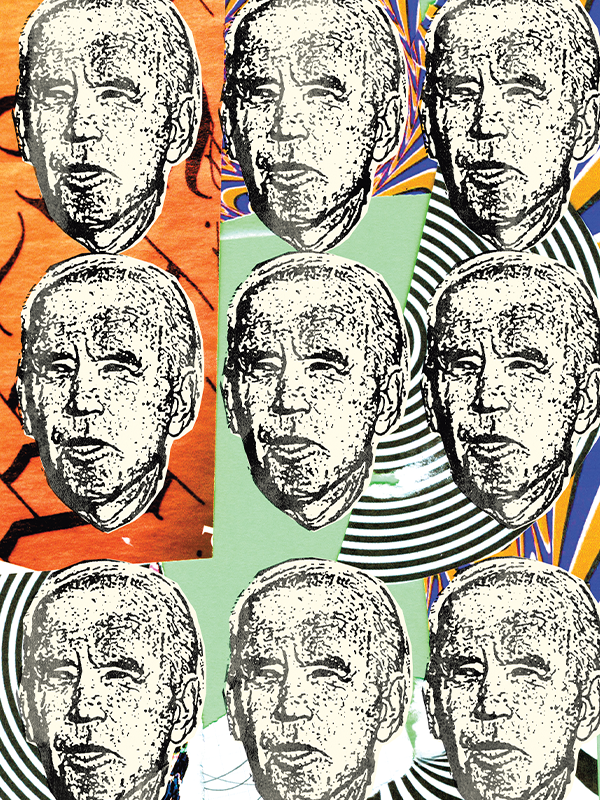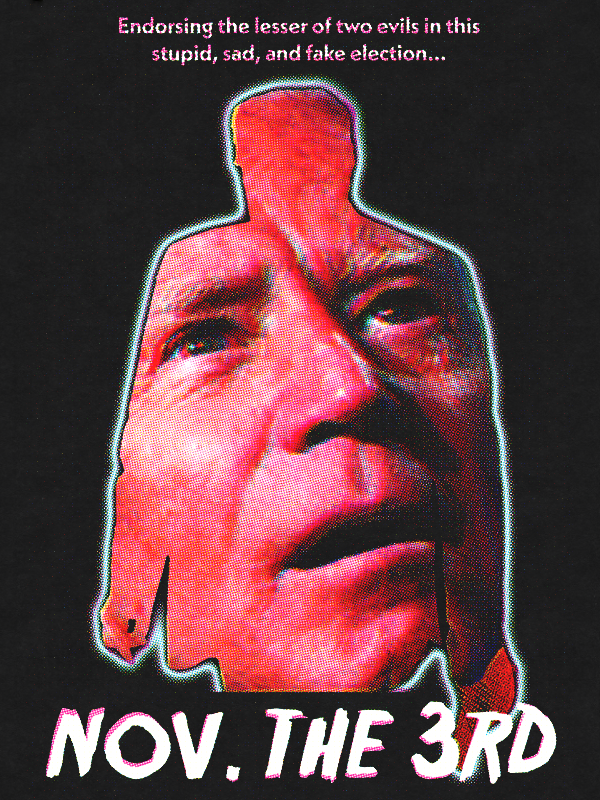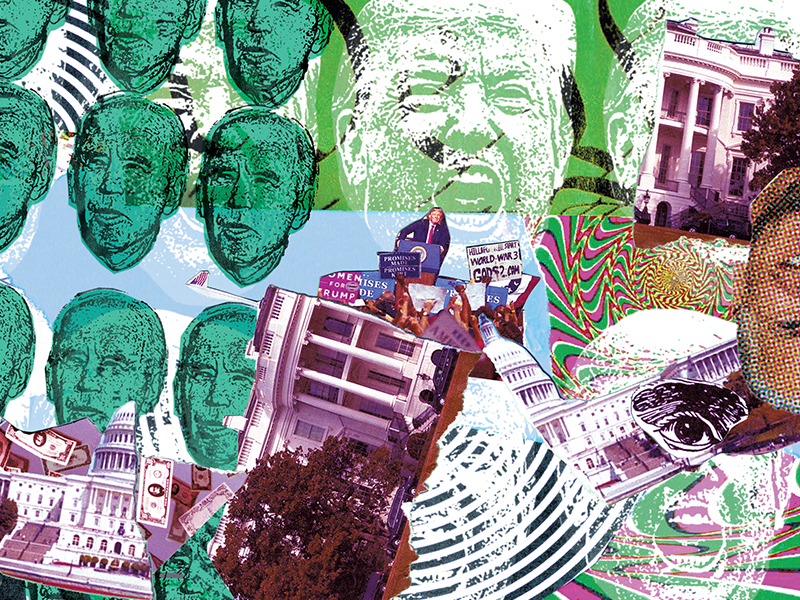We got off the train and looked for the people we knew amid all the thousands that we did not. The people in my union were supposed to wear heavy knit hats with the union logo on it, but other groups had similar ideas, and also it wasn’t cold enough on that day in January of 2017 for a hat. So we passed by different pods of protestors in their own signifiers, in search of ours. They had signs and shirts and hats and pins that identified them as members of labor organizations or community organizations or different universities or just friends or peers who had come out to say, in so many words, “fuck all this,” all of them filling the streets to express a shared disgust at the election of Donald Trump to the office of President of the United States.
None of them were wrong to protest the election of a man who is, objectively, one of the worst and most unpleasant humans of his generation — the damp and pampered son of the city where I live, a man doomed by his laziness and incuriosity and zero-sum bigotry to forever live inside an edition of The New York Post from 1987. That objection is broad, as causes go, but it was and remains a perfectly good reason to get out there. The protest devoured miles of midtown Manhattan; in catching up with friends afterwards, I was surprised to learn that they found their groups 10 or 15 blocks south or east or north of where we finally found ours. It was understood that we were all headed the same way.
We waited for the signal to start marching. When it came, the news rustled the crowd but didn’t actually move it. The route had a terminus, but it was unclear which way we were supposed to go, or who we were following. There were a lot of signs held up in the lull, and we read them as the crowd bristled and ebbed and waited. The general tone was wry disapproval and a diffuse anger at finding ourselves governed by a defective celebrity who had been reinvented as a cretinous avatar of every brutal and backwards impulse in the culture, over the course of the most dispiriting presidential campaign in recent memory. It was what would now be pointedly termed a Peaceful Protest, in the sense that it ended when it was supposed to, the cops watching it happen got overtime without breaking a sweat, and nothing changed as a result.
Earlier this year, marching again, I was reminded of a sign I saw several times that day, whose message was “If Hillary Had Won, We’d All Be At Brunch Right Now.” During the time between those protests and these, the sentiment had become a metonym for the fervent fecklessness of liberal #resistance politics, and so became a much less amusing and much more pointed gag than it was initially. In the summer of 2020, at some very different marches, I saw its apotheosis — people were once again filling the streets, this time to express their dissatisfaction with the official cruelty and wild viciousness of the state, now chanting much ruder and much more specific things, buffered by a notably greater number of notably more keyed-up cops. As those new marches made their way down the avenues, they met people who were, in fact and quite literally, At Brunch, Right Then.
The two halves of this exceptionally awkward binary were not exactly in opposition. It’s more that as Trump’s predictably abhorrent first term in office has run its shameful course, the movement opposing Trump and his administration has both snapped into focus and slipped off-beat. Or more to the point, it has split into a different dynamic — between people who oppose Trump and his uniquely vicious administration, and those who have joined a longer fight against Trumpism — a violent, punitive, and overtly racialized revanchism that is as much a cultural pathology as it is a politics, and which existed before and will exist after Trump. With a presidential election coming up, and with so many other ostensibly load-bearing national institutions collapsing or already collapsed into dust, the two halves of that opposition are once again forced to share space: the ones chanting down the avenue and the ones observing. All of them in opposition, but only some of them on the march.
All these people, whose goals and beliefs are very different, are supposed to vote for Joe Biden in November. Joe Biden is 77 years old, exactly who he is, and promises to make things feel the way they did before Trump and virtually nothing else. He will either be the next President of the United States, or Donald Trump will get another term. It’s complicated, but not more complicated than that.

Order theLAnd’s 2020 Election Zine
To the extent that there is any kind of campaign message at all where Biden is concerned, the pitch has strikingly little to do with policy.
Biden has been in politics for a long time — he first ran for President in 1988, when he was 45 years old and had already been in the U.S. Senate for 15 years — and has always been good at getting voters to like him and notably bad at giving them an urgent reason to vote for him. At this low national ebb, with the support of an aged and change-averse establishment within his own party, Biden has found his moment — a campaign in which simply not being his opponent looks like a winning argument. His relatively progressive official platform aside, Biden and his surrogates have spent a great deal more time and seemed much more in their element when talking about the things that they would not do if given power: pursue Medicare For All, reduce military spending, curb police abuses, or otherwise alter the balance of power in our increasingly untenable nation.
Much of this is the rote kicked-dog reflex of a long-tenured elected Democrat. Since being trounced in a couple of elections by Ronald Reagan’s increasingly reactionary Republican party a couple generations ago, both Biden and the most powerful people in the Democratic party — the ones who worked to swing the nomination to him, and who hold sway in the party’s majority delegation in the House and minority in the Senate — seem at some point to have come to understand their jobs as fundamentally janitorial. They dutifully clean up all the blood and champagne vomit that the Republicans invariably leave behind on their way out of office and then hand over the keys when it’s time for America’s reactionaries — who have under Trump embraced an unbridled, unapologetic, deeply American fascism — to once again take their turn. One party is dedicated to making things much more unfair and sadistic; the other seems to see that collapse inevitable and now sees its job as making sure it all happens more slowly, and both less egregiously and more efficiently.
Biden and his class of Democratic leaders live far from the brutal and unfair facts of American life. They’re old and abstracted enough to see politics as a parlor game played between friends. For them, preemptively caving on necessary-but-difficult things like Medicare For All seems not just reasonable but savvy. This was how the leftmost of the nation’s two political parties came to preemptively give away its leverage on policies that could have changed and saved lives — and, not for nothing, probably swung some elections — while the other party embraced its passion for ethnic cleansing, voter suppression, and spit-shined jackboots. By promising not to try to make things too much better, candidates like Biden signal how reasonable they are to a notional pool of winnable voters who, while not actively aligned with the idea of making things worse, are uneasy about the changes that would be involved in making them better. They offer nothing to the non-voters who have correctly assessed that none of this is really for them.
During their periods in power, the Democrats were reasonable and keen to compromise and prone to the clever double-bank legislative play. Republicans, for their part, started foreign wars and staffed up the state with thousands of new violence workers — the people prying the children of immigrants from their parents’ arms before disappearing both into unaccountable domestic gulags awash in disease and abuse, or pitching tear-gas at Black Lives Matter protesters in the nation’s capital when they got too close to the White House for Trump’s comfort. As President, Trump has mostly watched TV and pitched clammy fits online, but he has also hurt a great many powerless people at home and abroad and promises daily to hurt more; he’s helped the rich and untouchable become wealthier and more invincible, and installed callow young judges whose sole qualification for their lifetime appointments was that they would never allow any of the above to be undone. He doesn’t really care about any of it beyond how it plays on TV, which is both outrageous and objectively the least outrageous aspect of any of it. He is a disgusting man — cartoonishly vain, howlingly stupid, passionately cruel — and he has been a disgraceful President.
Against this, the Democratic Party came together to reject a more explicitly egalitarian response to Trumpism in favor of selling Joe Biden’s decency. They frame the election as a rejection of Trump himself, and not the reactionary movement he’s shaped. “The best reason for electing Biden, according to this message, is not what he will do,” Jack Mirkinson wrote at Discourse Blog. “It’s who he will be.” It’s still unclear what that would mean, and it is hard to escape the sense that Biden’s presidency would be more about humanely mourning what’s lost forever than building whatever’s next. But after four years of Trump’s monstrous travesty of a presidency, it might still work.

There’s no sense in denying it: the strategic cowardice and tactical mediocrity of Biden’s campaign is heartbreaking and dangerous. This election will be held amid a confluence of national catastrophes; the next administration will either confront crises that are currently killing people every day — economic inequality, unaccountable state violence, climate change, a still-raging pandemic that the nation never quite got around to managing — or leverage them to keep making things worse for all but the richest and least-responsible Americans.
There is nothing in Biden’s past record or current campaign that suggests he is the person to meet any or all of these challenges. It has been a generation, at least, since the Democrats openly campaigned on making things better for the many millions of Americans — a number that long ago tipped into a majority — being punished by our harsh and unyielding status quo. Bernie Sanders’ campaign was predicated on a break with that criminal passivity; Biden’s nomination is its triumph.
But there is also the matter of all those people in the streets, who are still there. National politics is what it is: shitty television for tired old people to watch, the peg for innumerable cheesy grifts, the single worst industry on earth. But politics itself happens elsewhere, everywhere, under and over all the rest of this and all the time. Joe Biden won’t change anything about American life beyond stripping the Trumpian crassness and cruelty and chaos from its day to day; this is something like the fundamental promise of his campaign. It is a shamefully, laughably insufficient response to a strident American fascism, and a breathtakingly cynical one; while the reality of that fascism is reason enough to cast a vote against it, Biden has been careful to promise nothing beyond that. They’re betting that it’s still enough to earn a vote, and on balance, it absolutely is.
The end of this administration would mean a great deal, but nothing, let alone Trumpism, will end with Trump’s defeat. Voting matters, but what comes next will matter more. That work is in the future, and it won’t begin or lord knows end with Joe Biden’s election, although getting Trump out of the fucking paint is a decent place to start. Some people will take such an outcome as a reason to get back to their mimosas, but none of us should take it for granted. The real and necessary repudiation of Trump was not ever going to come from this cringing, calculating Democratic party, or this nullity of a nominee, or people whose politics begin and end with the inalienable right to brunch. The future belongs to the people who want more than that, and who are willing to fight for it — who know where they’re going and why, who will keep at it even as the others fall away, who will stay on through the darkness because of how much they want to see the dawn.
This story appears in theLAnd’s election zine. Order your print copy here.
theLAnd Voter Guide 
- Immigrant Activists Have Given Me More Hope Than the Democratic Party
- The Progressive Challenger Who Wants to Unseat a Democratic Titan
- Endorsing the Lesser of Two Evils in this Stupid, Sad, and Fake Election
- A Conversation With Kendrick Sampson on Activism and Police Abolition
- Jackie Lacey Vs. The People
- The L.A. Politicians With More Power Than the Mayor
- A Battle for the Soul of California: An Oral History of Prop 15
- Godfrey Santos Plata Wants to Stand Up to Your Landlord
- Fatima Iqbal-Zubair is the Antidote to 2020 Pessimism
- Holly Mitchell is Ready to Take on Los Angeles
- Is George Gascon Really the Godfather of Progressive Prosecutors?
- L.A. Progressive Voter Guide
- Nithya Raman, the Progressive Candidate Running for City Council
